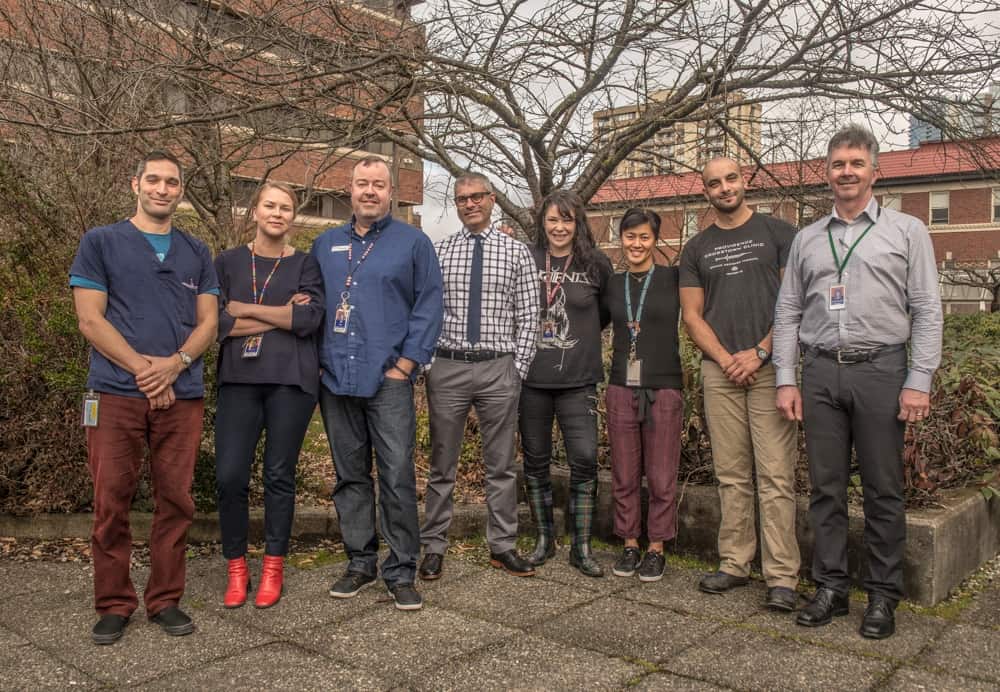The RAAC represents fast access to care when time is of the essence
Addiction medicine is one of the fastest growing fields of medicine anywhere in the world. Nowhere is that more evident than at St. Paul’s, where the innovative work of substance use experts has the world watching.
One of the newest and most promising movements in the field is found in the very name of a new clinic at St. Paul’s—“rapid access.”
The timing of the new Rapid Access Addiction Clinic (RAAC) couldn’t be better. For patients with substance use disorder, addiction medicine experts were seeing too many obstacles to evidence-based care, too much red tape, resulting in a vulnerable population not getting the care they needed, when they needed it.
Today, as this innovative, patient-focused clinic is showing us, those voices for change were right. Already, rapid access is changing the way an entire patient population is cared for.
Why rapid access is so important
For people with substance use disorders, rapid access to specially trained caregivers and evidence-based treatment is critical because we are often dealing with crisis situations—and the small windows for treatment that can open around them.
A person who has survived an overdose, for example, is more likely to take stock of their life and situation. In other words, if they are going to think about change, it’s going to be now.
Or there’s the “moment of clarity” that can bring a person to a clinic for help—but just as quickly that person may panic, turn around and walk out.
These are the moments when help needs to be there. It is these moments that the Rapid Access Addiction Clinic is built upon.
“Rapid access has always been that big gap in the system,” says RAAC Clinical Nurse Leader, Nancy Chow. “So we are low barrier. Our mandate is to see people as quickly as possible and to make it easy for them to access treatment.”
Windows of opportunity
Nancy Chow speaks to how the “stages of change” are used to assess a person with a substance use disorder, with those stages being pre-contemplative; contemplative; planning; action; maintenance; and relapse.
“When a person is contemplative,” says Nancy, “that is when they are acknowledging there is a problem, they are thinking about needing change, about wanting help, and that window can be small. They may not be in that contemplative stage for long before falling back to pre-contemplative. When that happens, you have missed an opportunity to help.”
For substance misuse patients, rapid access to treatment helps to keep those windows to treatment open wider—and longer.
Addiction affects everybody
“The greatest thing about the RAAC,” says Sherif Abouamara, a nurse at the clinic, “is that you have all the resources you need in one place. You can see a social worker, a nurse, a doctor—in one day. You can get started on medication in one day. That’s what’s special about the RAAC and sets it apart.”
In his line of work, Sherif has seen his share of human suffering; but he has seen success, too.
“A woman came in with her husband, they had two kids at home, and this family was losing him to addiction. Crystal meth was his drug of choice. She was able to call one day, make an appointment, and she convinced him to come in with her. They were engaged that first day, and then we would see them following up weeks later. Today that family is together and he has been abstinent. Rapid access on that first day was critical.”
As staff at the RAAC recount their stories, the clearer it becomes that the drug issue reaches far beyond the borders of the Downtown Eastside.
“It’s unfortunate,” says Sherif, of society’s misinterpretation of the drug problem. “Addiction doesn’t affect one group of people, but that’s the stereotype. It affects everybody.”
Who’s behind the RAAC?
With future expansion planned, the RAAC currently occupies a series of small, unassuming corridors on the second floor of St. Paul’s, above the St. Paul’s Teck Emergency Centre, with its close proximity to Emergency fully intentional.
The atmosphere is busy but controlled. There is a sense of calm. A big part of this aura is the staff: the physicians, nurses, social workers and peer navigators who comprise the RAAC team and whose years of experience in the field is a palpable presence.
The RAAC opened in September, 2016, ahead of schedule in order to help address BC’s opioid crisis and the impact was immediate: over 250 patients were treated in the first four months of operation, with 110 of these patients immediately commencing opioid replacement therapy such as Suboxone.
Over the next several weeks, St. Paul’s Foundation will share stories from four members of the RAAC staff—a social worker, a clinical nurse leader, a peer navigator and a physician—for a glimpse into one of the world’s newest and most innovative approaches to substance use disorders—rapid access.
With much room (and need) to grow this vital and already impactful program, friends of St. Paul’s Foundation are encouraged to help, here at the outset, by making a donation to support the work of the Rapid Access Addiction Clinic.
